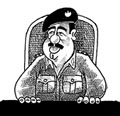| |||||||||
|
SAUDI ARABIA'S FIRST ENGLISH DAILY 22 March 2003 / 19 Muharram 1424 |
|
|
US Media Battle for Hearts and
Minds The images are electrifying: real time footage of jets and missiles
dispatched from US carriers, and of tanks and helicopters sweeping across
the open Iraqi desert in what is already being described as ‘the race to
Baghdad,’ all available on the 24 hour cable channel nearest to you. But the Pentagon strategy of “embedding” is not intended to turn war
into prime-time home entertainment, with the play-by-play commentary by
retired superstar generals like Wesley Clark, the supreme NATO commander
for the Kosovo campaign, and Norman Schwarzkopf, who commanded Operation
Desert Storm to drive Saddam Hussein from Kuwait in 1991. The reports from the ‘embeds’ are aimed at two hugely important
targets: the minds of Iraqi commanders, and public opinion back home. The dramatic pictures are as much a weapon as the tens of thousands of
troops, the hundreds of warplanes with their state-of-the-art munitions at
the Pentagon’s disposal. And none have been more dramatic than those on
CNN, depicting advance units of the heavily armored 7th Calvary thrusting
north west out of Kuwait, past Bedouin nomads and the carcasses of Iraqi
tanks destroyed in 1991. It was of course the 7th Cavalry, as someone unkindly noted, which
perished with General Custer in 1876 at the battle of the Little Big
Horn. This time though the roles, as projected to international TV audiences
(which undoubtedly include the Iraqi high command and other viewers in
Baghdad), is exactly reversed. US planners calculate that any of Saddam’s lieutenants who might be
wavering will only have their doubts reinforced by the spectacle of what
CNN’s embedded correspondent (on a self-confessed adrenalin high) calls “a
giant wave of steel” - 70-ton A-1 M-1 Abrams tanks, Bradley fighting
vehicles and Apache helicopters buzzing in the skies around - bearing down
on Baghdad, at speeds of up to 35 mph. The potential damage to Iraqi
morale far outweighs any problems that arise from any military
intelligence the live TV pictures might betray. The TV coverage, therefore, is part and parcel of Washington’s
desperate desire to minimize the civilian casualties and damage to Iraq’s
infrastructure, which could turn world opinion irretrievably against
America. This is a war in which the US wants to cow, not bomb, its foe
into submission. That in turn explains why the US, contrary to most pre-war
expectations, has not embarked on the “shock and awe” bombing campaign
that would have rained 3,000 precision-guided munitions on Iraqi targets
in the first 24 hours of the war. It also explains why Donald Rumsfeld, the Secretary of Defense makes
such a point at every press conference of urging Iraqi commanders to lay
down their arms, rather than their lives for a cause that cannot be
won. That is the message delivered by the millions of leaflets which have
been dropped by US and British warplanes over southern Iraq. Rumsfeld
claims “broad progress” in the initiative. US intelligence operatives are now reported to be e-mailing key Iraqi
military officers urging them to surrender, in addition to the hundreds of
ordinary soldiers who have already done so. But there is another important reason for the open strategy. The war
seems to be going pretty well so far. But this has been the easy part. The stiff resistance (if there is stiff resistance) will only come when
the “giant wave of steel” hits the environs of Baghdad where Saddam
Hussein’s best troops are waiting. At the back of the collective Pentagon mind is Vietnam, when
journalists ran loose across the battlefield and their reports depicting a
futile, bloody and unwinnable war turned US public opinion decisively
against the conflict. Both the British (in the Falklands) and then the US-led coalition in
the first Gulf war 12 years ago took the lesson to heart. Media access in
both campaigns was limited at best. This time the Pentagon has struck a
compromise: up-close media coverage, yes, but on our terms. Thus far the tactic has satisfied both sides. The Pentagon is getting a
massive propaganda bang for its buck, and TV, in particular, is getting
live pictures to kill for. General Tommy Franks, the equivalent this time
of Gen. Schwarzkopf in 1991 — but no ‘Stormin’ Norman’ in the eloquence
and charisma stakes — has not yet had to give a single news briefing from
the $250,000 Hollywood-style set at his Central Command headquarters in
Qatar, on the overall development of the campaign. The Schwarzkopf swagger was an enduring image of Gulf War One. This
time it’s a safe bet already that America will remember this war for,
among other things, CNN’s Walt Rogers atop his Abrams tank. But there will
be another, more subtle advantage for Rumsfeld, if things do go wrong. Journalists are like other humans in a battlefield setting. They get to
know, like and sympathize and identify with the troops they are with - and
on whom, if the worst comes to the worst, their very physical survival may
depend. For that reason, the Bush administration undoubtedly reckons, the
patriotic factor will loom large if the coalition assault does get bogged
down or meet heavy opposition. It may not be so, if casualties are heavy,
or if the campaign comes to a horrific street fighting climax in
Baghdad. But for the moment, the 2003 Gulf War is a road test for the dictum
attributed to Lyndon Johnson (who else?) on dealing with awkward friends
and troublesome foes, that “it’s better to have them inside the tent
pissing out, than outside the tent pissing in.” And the Pentagon fervently
prays, long may it remain so. Arab News Opinion 23 March 2003
|
| ||||||||||||||||||||||||||||||||||||||



